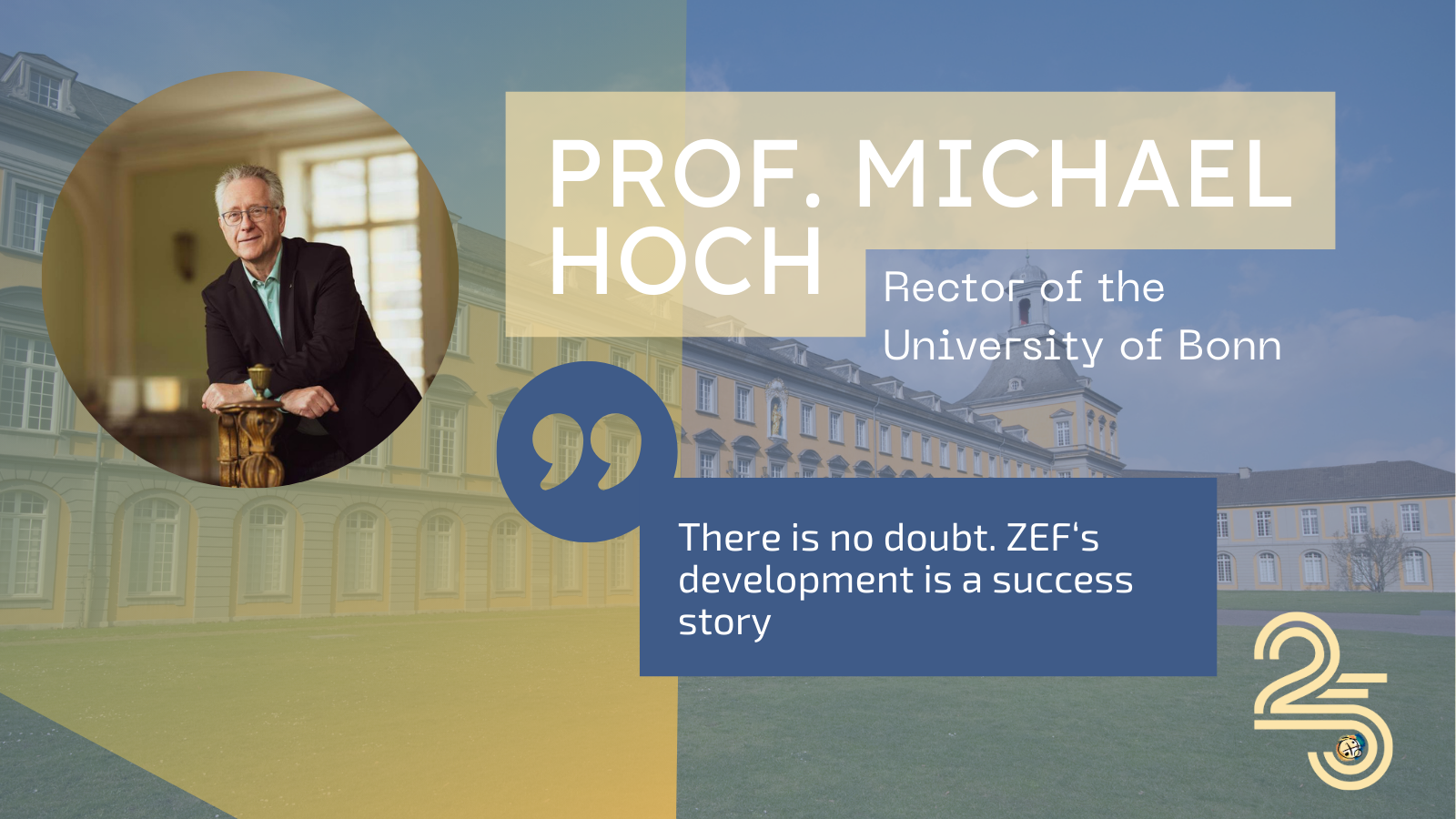Dear distinguished friends of ZEF,
Twenty-nine years have now passed since the Rectorate and Senate of the University of Bonn decided back in 1995 to establish an academic think-tank for international and interdisciplinary questions of development research, the Center for Development Research, or ZEF. ZEF’s foundation was made possible by the Berlin-Bonn Act and the financial support of the federal government and the state of North Rhine-Westphalia, and it was able to be negotiated after the German Bundestag reached a decision on the country’s future capital in 1991 in the wake of its reunification. In academic terms, ZEF was originally geared toward providing insights from development research for global benefit and serving Germany on a national scale as well as the state of North Rhine-Westphalia and the federal city of Bonn with an international agenda. No such research institute existed in Germany up to that point. Demand for research-based advice on development and science policy was growing after the fall of the Iron Curtain: within Germany, in emerging economies around the world, and among global institutions such as the UN and the World Bank. Furthermore, in 1996, Bonn became the German city of the United Nations. Thus, ZEF fitted very well into the political agenda of that time in Germany.
More than 25 years have now passed since ZEF opened its doors. There is no doubt: ZEF’s development is a unique success story. It has become one of the world’s most renowned and most important think-tanks on development policy and development research. Looking back, one might wonder how this was possible. Thanks to some great recruitment, excellent research by outstanding and inspiring researchers, its motivated staff, a fantastic educational program for early-career researchers, the highly dedicated members of its advisory board, an outstanding network of global partners and, of course, the continuous support of the University, the ministries and the many donor agencies that have funded research and education at ZEF over the past few decades. Between 1999 and 2022, ZEF’s interdisciplinary doctoral program provided excellent training and support for more than 480 doctoral students from 80 countries who now hold positions of responsibility in the most prestigious organizations and institutions in all parts of the world. Many of the alumni who have worked with ZEF as postdoctoral and senior researchers are now actively helping to solve global and local problems through their work in international organizations, governments, research institutes, businesses, NGOs and civil society initiatives.
Looking at it today, one might ask whether an institute such as ZEF is still relevant and necessary? We firmly believe that it is, more than ever! Severe environmental and climate crises, the COVID-19 pandemic that caused worldwide health and economic shocks, flaring conflicts and wars, global refugee flows, a growing population. These are all gigantic challenges that are, of course, interrelated and that the global community must cooperate in order to solve. This becomes more and more difficult in times of severe political conflicts with rival systems threatening democracies and the liberal order.
What we as a University can contribute is excellent research and education to help provide solutions to these global questions of the present and future, and ZEF lies at the heart of the University’s endeavours to achieve these goals. To lend ZEF further support, we have dedicated two of our High-Profile Professorships funded by the University of Excellence Program to ZEF and have recruited Ina Danquah (Hertz Chair for Innovation for Planetary Health) and Matin Qaim (Schlegel Professorship for Economic and Technological Change). Together with Christian Borgemeister, they are leading ZEF as its next generation of directors. In partnership with all its researchers, staff, students, and employees, ZEF is an academic powerhouse that is at the core of the University’s Sustainable Futures Transdisciplinary Research Area.
All that remains to say is this: congratulations on (more than) 25 years of ZEF. We are proud of ZEF’s outstanding history and stand ready to face the future!
Michael Hoch is the 143rd Rector of the University of Bonn and currently serving his third term. He has been Rector since May 2015.



Leave a Reply